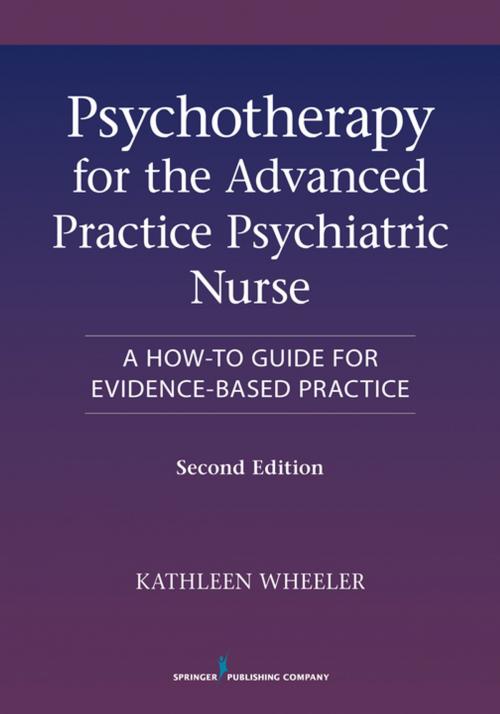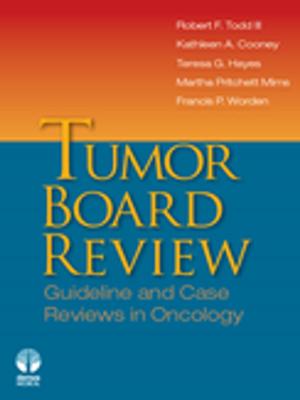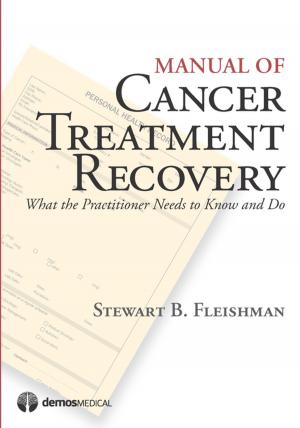Psychotherapy for the Advanced Practice Psychiatric Nurse, Second Edition
A How-To Guide for Evidence-Based Practice
Nonfiction, Health & Well Being, Medical, Nursing, Mental Health, Psychiatric| Author: | ISBN: | 9780826110084 | |
| Publisher: | Springer Publishing Company | Publication: | December 11, 2013 |
| Imprint: | Springer Publishing Company | Language: | English |
| Author: | |
| ISBN: | 9780826110084 |
| Publisher: | Springer Publishing Company |
| Publication: | December 11, 2013 |
| Imprint: | Springer Publishing Company |
| Language: | English |
"Dr. Wheeler has skillfully crafted a text that covers basic psychiatric principles and skills from developing a therapeutic relationship and assessing and diagnosing the client to providing evidence-based psychotherapy for a variety of patient populations... This text is an excellent primer for teaching therapy skills and, although targeting graduate psychiatric nursing students, would prove equally valuable for students of any mental health discipline. It is also a resource for experienced clinicians wanting to expand their understanding of trauma and how adaptive information processing might be used as an organizing framework for all psychotherapy."
--Linda Mabey, Journal of EMDR Practice and Research
DESCRIPTION
This is a how-to compendium of evidence-based approaches to practicing psychotherapy for both the experienced and neophyte advanced practice psychiatric nurse. This book integrates neuroscience with relationship science and unites disparate psychotherapeutic approaches into a model that is concise and straightforward, yet sufficiently comprehensive to provide a framework for practice. The most useful therapeutic models are highlighted with principles, and techniques of treatment for nurse psychotherapists and those with prescriptive authority. This second edition expands the award-winning first edition, providing guidelines, forms, and case studies to assist APPNs in deciding which treatment to use based on psychotherapy outcome studies and practice guidelines.
New Chapters in the Second Edition:
- Motivational Interviewing
- Dialectical Behavior Therapy
- Group Therapy
- Family Therapy
- Eye Movement Desensitization and Reprocessing (EMDR)
- Therapeutic Approaches for Addictions
- New CPT Codes & Reimbursement
Awards and Reviews for the First Edition:
APNA Media Award
AJN Book of the Year Award
5 Star Amazon Reviews
4 Star Doody Review
"Lays out a holistic paradigm for advanced psychiatric nursing (APN) practice by drawing upon a neuroscience of information processing, human development, attachment theory, and trauma. . . (and) explains the essentials of psychotherapy by melding principles underlying the therapeutic alliance, adaptive information processing (AIP), change, and a hierarchically arranged treatment format that fosters healing through the resolution of dysfunctional memory this important text holds true to the historical basis for psychiatric nursing being organized around phases and principles of the nurse-patient relationship."
Margaret England, PhD, RN, CNS, Perspectives in Psychiatric Care
"Wheeler offers the field a scholarly training manual. . . grounded in Shapiro's (2001) adaptive information processing paradigm . . .(where) the brain is viewed as an information processing system with innate self-healing mechanisms that regulate its internal environment to survive and to maintain a stable, constant condition through dynamic regulation."
Robert M. Greenfield, PhD, Journal of Trauma & Dissociation
"Dr. Wheeler has skillfully crafted a text that covers basic psychiatric principles and skills from developing a therapeutic relationship and assessing and diagnosing the client to providing evidence-based psychotherapy for a variety of patient populations... This text is an excellent primer for teaching therapy skills and, although targeting graduate psychiatric nursing students, would prove equally valuable for students of any mental health discipline. It is also a resource for experienced clinicians wanting to expand their understanding of trauma and how adaptive information processing might be used as an organizing framework for all psychotherapy."
--Linda Mabey, Journal of EMDR Practice and Research
DESCRIPTION
This is a how-to compendium of evidence-based approaches to practicing psychotherapy for both the experienced and neophyte advanced practice psychiatric nurse. This book integrates neuroscience with relationship science and unites disparate psychotherapeutic approaches into a model that is concise and straightforward, yet sufficiently comprehensive to provide a framework for practice. The most useful therapeutic models are highlighted with principles, and techniques of treatment for nurse psychotherapists and those with prescriptive authority. This second edition expands the award-winning first edition, providing guidelines, forms, and case studies to assist APPNs in deciding which treatment to use based on psychotherapy outcome studies and practice guidelines.
New Chapters in the Second Edition:
- Motivational Interviewing
- Dialectical Behavior Therapy
- Group Therapy
- Family Therapy
- Eye Movement Desensitization and Reprocessing (EMDR)
- Therapeutic Approaches for Addictions
- New CPT Codes & Reimbursement
Awards and Reviews for the First Edition:
APNA Media Award
AJN Book of the Year Award
5 Star Amazon Reviews
4 Star Doody Review
"Lays out a holistic paradigm for advanced psychiatric nursing (APN) practice by drawing upon a neuroscience of information processing, human development, attachment theory, and trauma. . . (and) explains the essentials of psychotherapy by melding principles underlying the therapeutic alliance, adaptive information processing (AIP), change, and a hierarchically arranged treatment format that fosters healing through the resolution of dysfunctional memory this important text holds true to the historical basis for psychiatric nursing being organized around phases and principles of the nurse-patient relationship."
Margaret England, PhD, RN, CNS, Perspectives in Psychiatric Care
"Wheeler offers the field a scholarly training manual. . . grounded in Shapiro's (2001) adaptive information processing paradigm . . .(where) the brain is viewed as an information processing system with innate self-healing mechanisms that regulate its internal environment to survive and to maintain a stable, constant condition through dynamic regulation."
Robert M. Greenfield, PhD, Journal of Trauma & Dissociation















